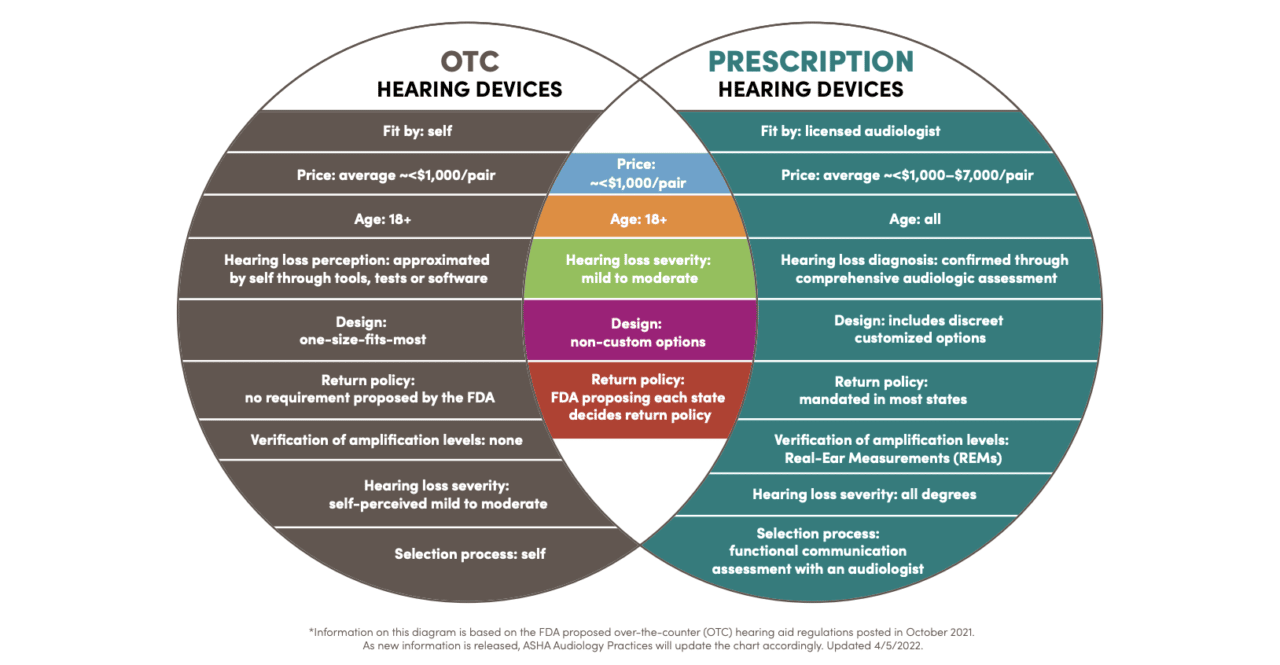Over-The-Counter Hearing Aids FAQ
Beginning in October 2022, the FDA will allow the sale of non-prescription or over-the-counter (OTC) hearing aids nationwide (FDA Reauthorization Act of 2017). The intent of the law was to allow individuals with perceived mild to moderate hearing loss to obtain a simple and lower cost hearing amplifier without first seeing a physician or audiologist for testing.
Who Are Over-the-Counter Hearing Aids For?
According to the FDA’s new rule, “Over-the-counter (OTC) hearing aids are hearing aids intended for people at least 18 years of age with perceived mild to moderate hearing loss. They will be available at stores and online retailers [who aren’t required to be licensed providers] without the need for a medical exam, prescription or fitting adjustment by an audiologist or hearing health professional.” They are intended for individuals who:
- Do not perceive that their hearing loss greatly impacts their day-to-day life
- Are comfortable with self-diagnosing hearing loss
- Are comfortable with self-fitting and adjustment of hearing instruments
Consumers should remember that hearing loss might be a symptom of a more serious underlying health issues such as tumors, diabetes, cardiovascular disease, or chronic kidney disease. Easily treated challenges like ear infections or impacted wax can also create the perception of mild to moderate hearing loss. In a 2018 report, the FDA stated, “Before getting a hearing aid, you should consider having a hearing evaluation to determine the type and amount of your hearing loss. The process can begin with a medical and/or audiological examination.
You can learn more here: How to get Hearing Aids | FDA
The National Institutes of Health (NIH) still recommends prescription hearing aids for people who “have significant difficulty with hearing.”
How Much Do They Cost?
Each manufacturer sets the price of these new devices, though a single pair could still run around $1,000, according to the American Speech-Language-Hearing Association. Unlike prescription hearing instruments, which have State level consumer protection, warranties and return privileges, OTC hearing instruments are sold in the same manner as other consumer electronics. Additionally, they are designed to be “self-fitting.” With prescription devices, a portion of the fees typically covers all related fitting and adjustment services.
Will OTC Devices Work for Me?
Before considering the purchase of an OTC or prescription device, consumers are advised to determine if a hearing loss is present and if any comorbidities exist. Talk to your doctor about who could best evaluate and offer potential solutions for your hearing needs.
How Can An Audiologist Can Help?
Every patient’s needs are different. Our providers can establish a treatment plan best suited for your hearing loss and lifestyle. Our audiologist will also determine if your hearing loss is caused by a more serious or a medically treatable condition and connect you with the appropriate care.
Additionally, our providers offer ongoing support as you navigate hearing loss treatment. Your hearing loss may change with time and require adjustments to any hearing aids we provide. Our team is here to help you every step of the way. Call today to set up an appointment with one of our audiologists.
